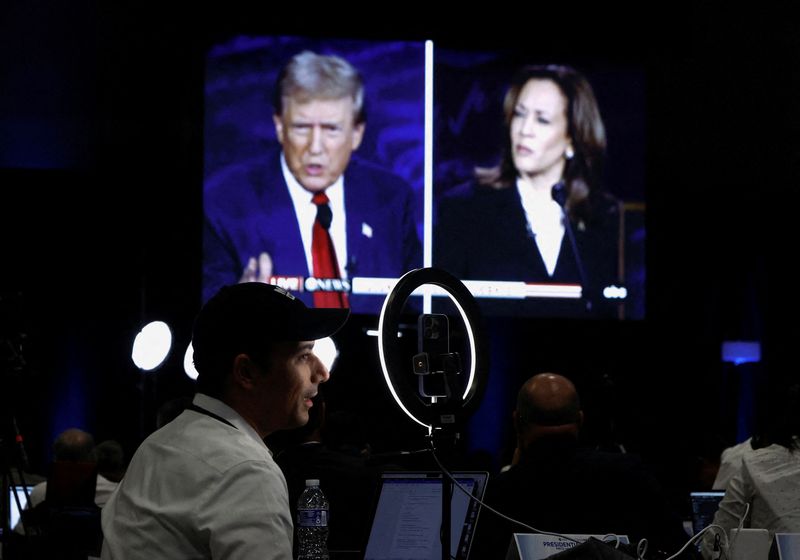Investing.com -- As the 2024 election approaches, high-skilled immigration policy, particularly the H-1B visa program, remains a critical point of discussion, with stark differences between the approaches of Kamala Harris and Donald Trump.
While Harris is seen as potentially seeking to expand legal immigration, analysts from Jefferies are skeptical about the likelihood of such reforms passing through a deeply divided Congress.
The H-1B visa program allows U.S. employers to temporarily hire foreign workers in specialized fields, such as technology, engineering, and healthcare.
This visa program is particularly important in sectors requiring at least a bachelor’s degree, ensuring that foreign professionals receive salaries on par with American workers.
The current cap on H-1B visas is set at 85,000 per year, limiting the number of skilled workers entering the U.S. labor force.
Under the Trump administration, the program became slower, more restrictive, and costly for employers and employees alike.
President Trump’s "Buy American and Hire American" executive order marked a fundamental shift in business immigration policy, introducing several barriers, such as narrowing the degree requirements and increasing the number of requests for evidence (RFEs) by 66%.
This led to longer processing times, rising by 46%, and higher uncertainty for both employers and applicants.
Trump also sought to increase prevailing wage requirements by 100% and proposed selecting H-1B applicants based on income levels instead of the traditional lottery system, further disincentivizing employers from hiring foreign workers.
The impact was notable, with the number of H-1B applications dropping after his first year in office.
If re-elected, Trump is expected to maintain his stringent policies on business immigration. His administration's efforts will likely focus on tech and consulting sectors, which employ a significant portion of foreign workers in junior-level roles.
Jefferies point to a few key measures that could be enacted, including denying sponsorship for entry-level positions, restricting authorization for spouses of foreign workers, and mandating that fraud detection units sign off on every application, thereby increasing scrutiny and processing delays.
Trump’s continued focus on protecting U.S. wages and workers could significantly hinder the number of foreign workers, especially in high-demand sectors like technology.
In contrast, Kamala Harris, who has previously advocated for removing national quota limits on permanent residency, offers a different vision.
“This policy would benefit Chinese and Indian nationals who face significant backlogs, while extending processing times to 7 or 8 years for other nationals,” the analysts said.
Analysts at Jefferies, however, note that any expansion of legal immigration faces substantial obstacles. Moreover, Jefferies is pessimistic about Harris's ability to successfully pass bipartisan legislation on immigration reform.
While there may be attempts to create pathways to citizenship for children of undocumented immigrants, the overall political climate suggests a strong backlash against any perceived expansion of business immigration. U.S. constituencies remain divided, with opposition to such reforms from sectors concerned about competition in the job market.
The Biden administration took a mixed stance on immigration. On the one hand, it continued some Trump-era restrictions, such as requiring applicants' degrees to be directly related to their job and subjecting certain nationalities, particularly Chinese and Russian applicants, to more stringent scrutiny.
“Meanwhile, Biden restored the deference memo to base admission on past approvals, simplifying the approval process, and expanded work authorization to eligible family members,” the analysts said.
Additionally, Biden prioritized applicants in emerging industries, such as artificial intelligence and clean energy, aligning with his administration’s broader economic and environmental goals.
While these reforms have provided some relief for businesses and foreign workers, they have not led to any significant increase in the number of H-1B visas or broader reforms.
As per Jefferies, the chances of legal immigration reform under Harris are low, even if she becomes president.
The partisan divide in Congress makes it unlikely that substantial changes will be passed, particularly regarding business immigration.
Immigration remains a politically sensitive issue, with strong opposition from various constituencies, making any attempt to expand legal immigration highly contentious.
Furthermore, the technical and consulting sectors, which rely heavily on junior-level foreign workers, may continue to face challenges if immigration policies remain restrictive.
